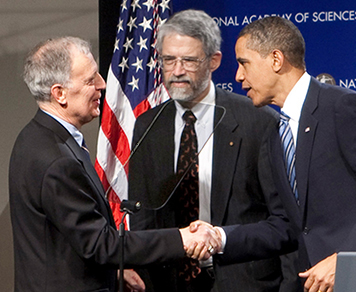Ralph J. Cicerone, who served as president of the U.S. National Academy of Sciences (NAS) from 1 July 2005 through June of this year, died at his home in New Jersey on Saturday at age 73. A world authority on atmospheric chemistry and climate change, Cicerone was widely regarded as an authoritative and gentlemanly voice for science.
He “was a model for all of us of not only doing what counts, but doing it with honesty, integrity, and deep passion.”
“The entire scientific community is mourning the sudden and untimely loss of this great leader who has been unexpectedly removed from the forefront of the scientific issues that matter most to the future well-being of society,” Marcia McNutt, Cicerone’s successor as NAS president, said in a statement. Cicerone and McNutt both served as former presidents of the American Geophysical Union, Cicerone from 1992 to 1994 and McNutt from 2000 to 2002.
“Ralph Cicerone was a model for all of us of not only doing what counts, but doing it with honesty, integrity, and deep passion,” McNutt said.
Rush Holt, CEO of the American Association for the Advancement of Science and executive publisher of the Science family of journals, remembered Cicerone in a statement as “a champion of science who helped scientists understand their obligations to society and helped non-scientists understand the importance of science to their lives, especially with respect to human induced changes of Earth’s climate.”
Influenced Climate Science Policy
As head of the academy, Cicerone played an instrumental role in several prominent studies about climate change. Those included a series of 2011 reports on America’s Climate Choices, which laid out motivations for action and outlined a comprehensive U.S. response to climate change, and a 2014 report, Climate Change: Evidence and Causes, released jointly with the Royal Society, the United Kingdom’s science academy. Also, prior to becoming NAS president, Cicerone led an academy study about climate change that then president George W. Bush had requested.
In a recent interview with Eos, Cicerone said that the biggest disappointment of his tenure as NAS head was the “rabid partisanship” surrounding climate change, which has included congressional grilling of climate experts and officials. “We are trashing our institutions. For example, the antigovernment feelings that anything the federal government touches is somehow dirty and wasteful and somehow morally wrong: this just drives me crazy,” said Cicerone, who died the day after the Paris climate accord went into effect.
Other Major Accomplishments

Among Cicerone’s other achievements while he was the NAS president, he established a $500 million Gulf Research Program following the 2010 Deepwater Horizon oil spill in the Gulf of Mexico and hosted two visits to the academy by President Barack Obama.
He also helped increase gender diversity in the academy’s ranks, seeing the number of women academy members rise from 9.5% (187 of 2062 members) in 2005 to 15.1% (354 out of 2351 members) this year. Of new academy members elected in 2016, 28.6% (24 out of 84) are women.
Cicerone pushed to maintain the quality of the NAS’s National Research Council reports despite a diminishment in federal reimbursements that help pay for those reports. He also spearheaded creation of the NAS Science and Entertainment Exchange, which connects Hollywood with scientists and engineers to bring more accurate science into popular films
Fields of Dreams: From Science to Sports
Immediately prior to serving as president of the academy, Cicerone was chancellor of the University of California (UC), Irvine, from 1998 to 2005. Cicerone did landmark research in atmospheric science. His research with Richard Stolarski in the 1970s was cited in the 1995 Nobel Prize in Chemistry that Paul Crutzen, Mario Molina, and F. Sherwood Rowland received for work about the formation and decomposition of ozone. Cicerone and Stolarski “had shown that free chlorine atoms in the atmosphere can decompose ozone catalytically in similar ways as nitrogen oxides do,” the citation noted.
While at MIT studying engineering, he also played varsity baseball and enjoyed watching Boston Red Sox games.
Cicerone received his M.S. and Ph.D. degrees in electrical engineering, with a minor in physics, from the University of Illinois at Urbana-Champaign. He earned a B.S. degree in electrical engineering from the Massachusetts Institute of Technology (MIT).
Alongside his enthusiasm for science and engineering, Cicerone also loved sports. He told Eos that while at MIT studying engineering, he also played varsity baseball and enjoyed watching Boston Red Sox games. “My senior year at MIT, I was finally doing well enough as a student that I went to baseball games in the spring. One year, I went to 31 games,” he recalled. Years later, UC Irvine named its baseball field for Cicerone, the driving force behind reviving the university’s baseball program in the 1990s.
Cicerone is survived by his wife, Carol; their daughter; and two grandchildren.
—Randy Showstack, Staff Writer
Citation:
Showstack, R. (2016), Former U. S. Science Academy president Ralph Cicerone dies at 73, Eos, 97, https://doi.org/10.1029/2016EO062673. Published on 07 November 2016.
Text © 2016. The authors. CC BY-NC-ND 3.0
Except where otherwise noted, images are subject to copyright. Any reuse without express permission from the copyright owner is prohibited.

